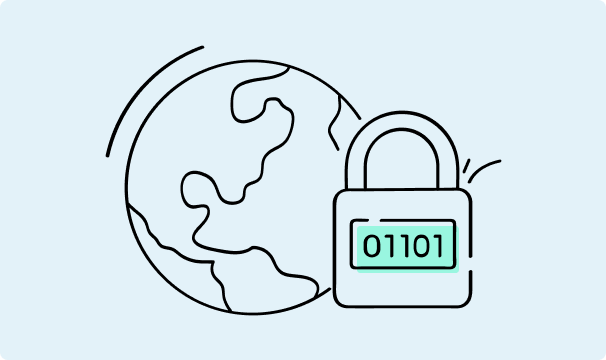How to Encrypt Internet Connection: A Comprehensive Guide
No one's forcing us to lock our front doors, but everyone does it anyway. Encryption plays a similar role in safeguarding your internet connection, except that many people still don't do it. The concept of encrypting internet traffic isn't so well-known.
Simply put, encryption makes information unreadable by unauthorized third parties. Just as someone without a key can't access your locked house, no one without an encryption key can access your encrypted data.
We're going to cover all the basics to start locking the cyber doors to your internet connection. With the right tools, sensitive data can be protected without much hassle.

Rasa Sosnovskytė
8 min read

Understanding Encryption
Encryption ensures that only the intended receiver can access the data you send. That's the basic idea seen in the history of encryption. It's implemented with cryptography techniques, allowing the conversion of unencrypted information into ciphertext.
A plaintext message like "Hello from CometVPN" can be converted into "U2F#sdGVkX18=" - unintelligible without a cryptographic key.
It's a random string of characters generated with complex mathematical algorithms for encryption and decryption. Even if your internet traffic falls into the wrong hands, it's protected by one or multiple such keys.
With your data under a cryptographic lock, no one can read or leak the data you send over the internet. Some companies, especially financial ones, are even required by law to protect sensitive data with encryption.
Why Encrypt Your Internet Traffic?
If you're still unsure whether to encrypt internet traffic or why use a VPN, just think about how many actors would like to snoop around your data. Certainly, you wouldn't allow them into your house without a reason!
- Your Internet Service Provider (ISP) handles all the data you send to the internet. That's why none of it is safe from their restrictions if unencrypted. Your ISP might block websites, throttle the bandwidth for services of their choice, or even sell your data to third parties.
- The government is monitoring citizens for potential criminal activity. Although it's more pervasive in authoritarian regimes limiting the freedom of speech, no country's citizen privacy is safe without encrypting their internet traffic.
- Cybercriminals exploit various vulnerabilities to get hold of your data. Lack of encryption creates a possibility for attacks like man-in-the-middle to get hold of your passwords, financial information, or other personal data. Besides learning how to know if your computer has a virus, its one of the most importan cybersecurity precausions.
- Ad trackers collect every action you make online to compile a digital profile. Websites use it to manipulate you with targeted ads or sell it to data brokers. Encrypting your internet traffic is one of the most effective means to fight against them.
Different Types of Internet Encryption
Just as a thief can break the door or lock, encrypted internet traffic can be brute-forced by guessing the encryption keys.
Luckily, there are many different ways to encrypt internet traffic, most of which would take thousands of years to decipher without the right key.
Symmetric Encryption
Symmetric encryption shares only one key between parties to secure an internet connection. It's the oldest and best-known encryption method, and it is still used for its speed.
AES (Advanced Encryption Standard) is the most secure symmetric algorithm that provides keys with 256 bits in length. It's the standard for most VPN services, although hybrid types are also common.
Asymmetric Encryption
Unlike the more simple symmetric encryption, asymmetric methods use two keys - public and private. That's why it's sometimes referred to as public-key cryptography. Anyone can encrypt messages with a public key, but only the holders of a private key can decrypt them.
RSA (Rivest–Shamir–Adleman) is the most popular asymmetric algorithm used mainly for digital signing and certificates but also for secure connections such as VPNs. It's much more secure but may cause performance drops.
HTTPS Encryption
The Hypertext Transfer Protocol (HTTP) used at the advent of the internet was quickly shown to be vulnerable. Unencrypted data could be intercepted and read by attackers. That's when HTTPS emerged.
It added a Transport Layer Security (TLS) cryptographic protocol, which uses a hybrid of symmetric and asymmetric encryption. HTTPS is the basis of ensuring passwords, payment information, and other private information are safe on the web.
End-To-End Encryption (E2EE)
To ensure only two users can read each other's messages, end-to-end encryption (E2EE) is used. It encrypts messages with various algorithms on the sender's device and allows them to be decrypted only on the receiver's end.
Although it doesn't secure the whole of your internet connection, it's widely accepted as the most secure way to communicate online. E2EE is implemented in most encrypted messaging apps, such as WhatsApp, Telegram, Signal, or Wickr.
WPA2 encryption
As the name suggests, Wi-Fi Protected Access 2 (WPA2) is used to secure wireless networks. Encryption methods, such as 128-bit AES, are used to create keys and encrypt data sent between devices in the network.
Most modern machines that connect to and establish wireless links are compatible with WPA2 as a standard. The longer, up to 256 bits, keys of the new WPA3 are preferable, but they aren't so widely implemented (learn more about WPA2 vs WPA3).
Methods for Encrypting Your Internet Connection
Encrypting your internet connection is easier than it looks. There's no need to learn any complicated math or monitor the processes. Internet traffic is encrypted automatically with the right choice of software and hardware tools.
WPA2 Encryption
Your internet connection itself cannot be encrypted since, without internet traffic, you aren't online. What's usually meant by an encrypted connection is protecting the data between your devices and the router with means such as WPA2 encryption.
Enabling WPA encryption is as easy as changing your WI-Fi settings. Enter your router's IP address (often it's 192.168.0.1) into a browser on a connected device and enter the admin panel.
Further instructions depend on the brand and model of your Wi-Fi router. Most often, WPA encryption can be found under wireless security settings. Enable WPA2 or WPA3 if your devices support it, save, and that's it.
Virtual Private Network
WPA2 encryption is a good start, but it won't protect the traffic from your network. Internet traffic encryption refers to securing the data that travels through an ISP from your device to the websites and services you visit.
A Virtual Private Network (VPN) is the best and most universal tool for such use cases. A remote VPN server is used to route your internet traffic. It changes your IP address and encrypts your data using a combination of different algorithms.
VPNs are the most universal method to hide your internet traffic from your ISP, hackers, and everyone else who wants to intrude on your privacy. VPN not connecting properly is one of the only real issue you can expect with most decent VPNs.
You will route all of your traffic through a VPN server, so it's crucial to use a trusted VPN provider and avoid free ones at all costs. You don't want your data in bad hands that keep logs to pass over to the government.
That's exactly what CometVPN avoids. Setting up a CometVPN is as easy as installing an app and turning on a switch. You can also set up a VPN in your router's settings to protect all devices simultaneously.
Tor Browser
Tor is a free and open-source network enabling internet encryption. The idea is to create multiple layers of encryption, which is why Tor stands for The Onion Router. Its browser, the Tor browser, encrypts your connection using a minimum of three volunteer devices called nodes.
Your network requests start with an entry node and then bounce through the middle and exit nodes before reaching the destination. Each node encrypts internet traffic, meaning that none of them has full access to keys.
Tor is widely used by journalists and activists to avoid authoritarian regimes. It's also the most popular method to access the dark web.
Installing and using the Tor browser is simple and free, but compared to VPNs, it's much slower for casual browsing or downloading. That's why it's more of a one-time solution than something you will use constantly.
Browser Extensions
Many browser extensions can improve your internet connection by encrypting information on your browser. There are dozens of such add-ons for the most popular browsers - Mozilla Firefox, Google Chrome, Opera, and others.
For example, browser extensions, such as HTTPS Everywhere, enable users to improve HTTP connections to HTTPS. Although, this is a bit outdated since the newest versions of modern browsers force HTTPS by default.
There are many other add-ons for encrypting traffic, email, passwords, plaintext messages, managing VPNs or proxy servers, and more. However, be cautious when using third-party extensions, as not all of them are safe.
Encrypted Messaging Apps
Tor and VPN help you encrypt internet traffic, but your online messages can still be exposed without using secure messaging apps. If your online communication is the most important data you want to protect, consider using encrypted messaging apps.
The best of them implement end-to-end encryption (E2EE) so that all communication can be deciphered only by the receiver. Not encrypting your messages exposes them to unauthorized access and data leaks.
Combining both of these methods creates a more comprehensive online security. Messaging apps will protect your specific communications, while a VPN will protect your internet traffic overall.
Encrypted Email Services
Many encrypted messaging environments are rather inconvenient. They lack useful functions and are much slower than non-encrypted apps.
That's why some prefer to have one secure channel that's already widely adopted and can be effectively encrypted - email.
Similarly to encrypted messaging apps, encrypted email services, such as ProtonMail or Tuta, use end-to-end encryption. Various encryption algorithms ensure that only the intended recipient can access the emails.
Email is traditionally considered a slower method of communication, which might also involve larger data transfers or important documents. Private email services ensure that such encrypted data is transmitted and stored confidentially.
Tips and Best Practices
You'll get the best protection if you combine all of the methods mentioned above. But encrypting everything might get overwhelming.
The best strategy is to choose the tools that can be used seamlessly while still encrypting your internet connection. That's why VPNs and WPA2 encryption are the first methods to try.
When choosing an internet traffic encryption tool, it's generally recommended to follow these tips.
- Never choose free tools. There's always a catch, and your data is likely to be sold.
- Keep your encryption keys secure. If you have any encryption keys, store them away from the data they protect, preferably offline.
- Consider jurisdiction. Check where the companies you rely on for encryption are located and if they are outside the Fourteen Eyes Alliance.
- No logs policy. Claiming not to keep any logs is not enough. The company's track record must also be clear of data breaches.
Conclusion
Encryption is a crucial first step of online security, equally important as locking your front doors. Other advanced security features are great, but is there really much use for them if anyone can decipher your data? Here at CometVPN, we pledge to give you the best start you can get.

Author
Rasa Sosnovskytė
Chief Executive Officer at Growth Bite
Rasa is a well-known SEO expert and co-founder of Growth Bite, a digital marketing agency. She has previously worked with globally recognized brands such as NordVPN, Oxylabs, and many others.
Related articles
4 min read
Ethernet vs Wi-Fi: Which One is Better?
Ethernet and Wi-Fi are the two main ways to connect your computer to the internet. While Wi-Fi has received significantly more attention in recent years, especially among consumers, due to its simplicity and flexibility, ethernet is still widely used in various other applications.
Even if Wi-Fi is significantly more popular, it isn’t strictly better. Both methods have their benefits and drawbacks. Wi-Fi’s popularity comes from its ease-of-use and flexibility, but an ethernet connection can be much more useful in certain scenarios.

Adomas Šulcas

5 min read
How to Change Chrome Proxy Settings: The Ultimate Guide
A proxy server is an easy alternative to a VPN that can perform most of the functions of the latter. It’s a server that stands between your device and the destination server, taking your connection requests and forwarding them in your name.
Destination servers in almost all cases see the proxy server as the originator of the request. As such, proxies are widely used in various, mostly business-related applications whenever privacy, security, location changing, and several other factors are at play.

Guoda Šulcaitė